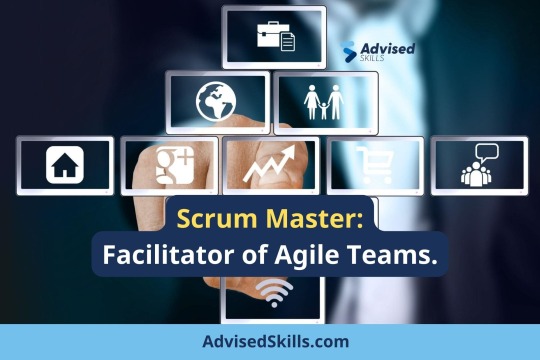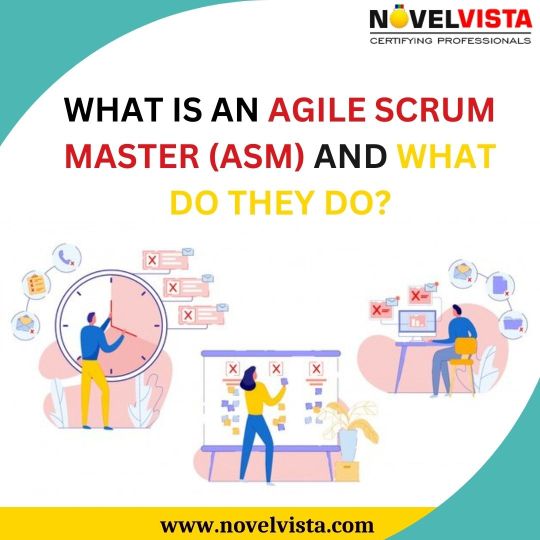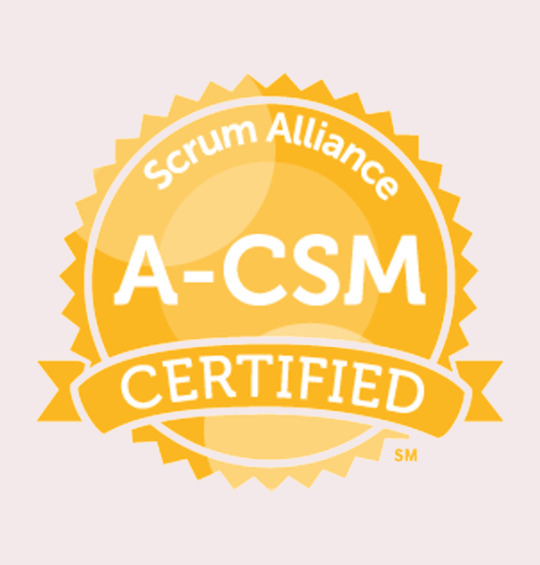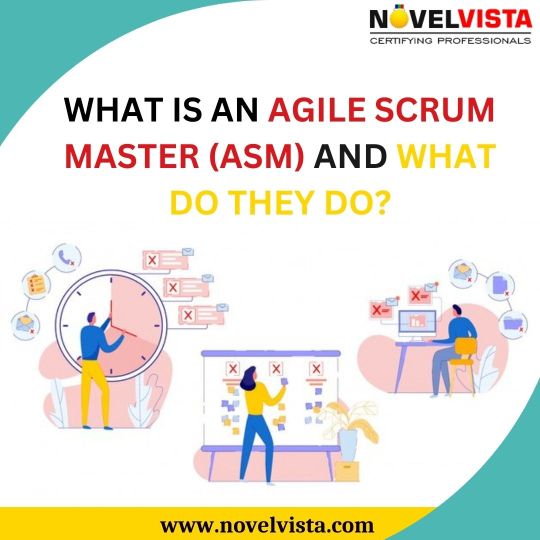#scrum master certification
Explore tagged Tumblr posts
Text
youtube
SCRUMstudy™ is the global accreditation body for Scrum and Agile certifications. It has authored the SBOK® Guide as a comprehensive guide to deliver successful projects using Scrum. SCRUMstudy™ works through its large global partner network of Authorized Training Providers (A.T.P.s) to deliver training and certifications. Important certifications provided by SCRUMstudy™ include Scrum Fundamentals Certified(SFC™), Scrum Developer Certified (SDC®), Scrum Master Certified (SMC®), Scaled Scrum Master Certified (SSMC™), SCRUMstudy Agile Master Certified (SAMC™), Scrum Product Owner Certified (SPOC®), Scaled Scrum Product Owner Certified (SSPOC™) and Expert Scrum Master Certified (ESMC™)
2 notes
·
View notes
Text
What is the Advanced Scrum Master Certification Exam?
The Advanced Scrum Master Certification Exam is designed for individuals who already have experience with Scrum and have typically obtained a foundational certification like the Certified ScrumMaster (CSM) or Professional Scrum Master I (PSM I). This advanced certification aims to deepen the knowledge and skills of Scrum Masters, enabling them to handle more complex challenges, lead teams more effectively, and contribute to the success of Agile transformations within their organizations.
Key Points about the Advanced Scrum Master Certification Exam:
Advanced Knowledge: The exam tests advanced Scrum knowledge, including how to handle scaling, resolving conflicts, and improving team performance. It also delves into Agile practices and the role of the Scrum Master in larger, more complex projects.
Prerequisites: Typically, candidates must have foundational Scrum certification (such as CSM or PSM I) and some practical experience working as a Scrum Master before attempting the advanced exam.
Popular Certifications:
Certified ScrumMaster – Advanced (A-CSM): Offered by Scrum Alliance, this certification focuses on enhancing the skills of experienced Scrum Masters in areas like facilitation, coaching, and team dynamics.
Professional Scrum Master II (PSM II): Offered by Scrum.org, this exam is aimed at those who want to demonstrate their ability to apply Scrum in real-world scenarios and lead teams to higher performance.
Content Focus:
Advanced facilitation techniques
Agile coaching and mentoring
Scaling Scrum across multiple teams
Conflict resolution and problem-solving
Advanced metrics and reporting
Organizational change and Agile transformations
Exam Format: The exam format varies by the certifying body but typically includes a mix of multiple-choice questions, case studies, and scenario-based questions that test practical knowledge.
Preparation: Candidates usually prepare through advanced Scrum courses, hands-on experience, and study materials provided by the certifying organizations.
Benefits: Obtaining an advanced Scrum Master certification can lead to career advancement opportunities, recognition as an Agile expert, and the ability to lead complex projects more effectively.
This scrum master certification is ideal for those who want to elevate their Scrum Master skills and play a more influential role in their teams and organizations.
#online certification and training#online training course#psm 2 certification#scrum master certification#scrum master
0 notes
Text
Discover the Best Scrum Master Certification and Scrum Product Owner Course in Hyderabad?
In the rapidly evolving world of Agile methodologies, obtaining the right certifications can set you apart in the job market and elevate your career. If you're in Hyderabad and looking to advance your skills, you're in luck. The city offers top-notch training institutes that provide comprehensive courses and certifications. Whether you're aiming to become a Scrum Master or a Scrum Product Owner, Hyderabad has the resources you need to succeed.
Why Pursue a Scrum Master Certification in Hyderabad?
Hyderabad is a thriving tech hub, home to numerous multinational companies and startups. As Agile practices become more prevalent, the demand for certified Scrum Masters has skyrocketed. A Scrum Master Certification equips you with the skills to manage Agile teams, facilitate communication, and ensure project success.
Several institutes in Hyderabad offer high-quality Scrum Master Certification programs. These programs are designed to provide a deep understanding of Scrum methodologies, tools, and techniques. The courses often include practical exercises, case studies, and real-world examples, making them highly relevant to the current industry needs.
Best Scrum Master Training Institute in Hyderabad
Finding the best Scrum Master training institute in Hyderabad can be a daunting task, given the plethora of options available. However, a few key factors can help you make the right choice. Look for institutes that offer certified trainers with extensive industry experience. The curriculum should be up-to-date with the latest Scrum practices and tools.
One of the leading institutes in Hyderabad offers a comprehensive Scrum Master Certification program. The course is designed to be interactive, engaging, and hands-on, providing students with ample opportunities to practice what they've learned.
Scrum Product Owner Course in Hyderabad
For those interested in taking on a more strategic role in Agile projects, a Scrum Product Owner course in Hyderabad is an excellent choice. As a Scrum Product Owner, you will be responsible for defining the vision of the product, prioritizing the backlog, and ensuring that the team delivers value to the stakeholders.
Hyderabad's leading training institutes offer specialized Scrum Product Owner courses that cover essential topics like product backlog management, stakeholder engagement, and value-driven development.
Why Choose Hyderabad for Your Scrum Certification?
Hyderabad's vibrant tech scene and availability of top-quality training institutes make it an ideal location for pursuing Scrum certifications. The city's institutes offer world-class training facilities, experienced faculty, and a supportive learning environment.
In conclusion, whether you're looking to become a Scrum Master or a Scrum Product Owner, Hyderabad offers excellent opportunities for professional growth. So, take the next step and enroll in a Scrum Master Certification or Scrum Product Owner course in Hyderabad today!
#Scrum Master Certification#best Scrum Master training institute in Hyderabad#Scrum Product Owner course in Hyderabad
0 notes
Text
Agile Expands its reach in future

The Agile Scrum Master certification will continue to be of great importance, so will the position of Scrum Master, as Agile expands its reach. To thrive in such circumstances, interested individuals must adopt changing fashions, exploit technological advances and grow their leadership skills.
#scrum master certification#agile scrum master#agile methodology#agilemethodology#training course#uae training#courses#dubai#training
0 notes
Text
Advanced Certified Scrum Master (A-CSM) Training | Learnovative
Enhance your Scrum Master skills with Advanced Certified Scrum Master (A-CSM) training from Learnovative. Our A-CSM course is designed to help you master advanced Scrum practices and methodologies, preparing you to take the next step in your Agile journey. Enroll now and become an expert in Agile project management!
The Advanced Certified Scrum Master (A-CSM) Training provided by Learnovative is a highly regarded Scrum certification offered by Scrum Alliance. As an authorized Registered Education Provider (REP), Learnovative conducts A-CSM Training in both physical classroom and live virtual modes. Our physical classroom training is available in major cities across India, including Bengaluru, Hyderabad, Chennai, Delhi, Kolkata, Mumbai, Pune, Gurugram, and Kochi.
call now : 099499 94949
#A-CSM Training#Certified Scrum Master#Scrum Master Certification#Agile Training#Learnovative#CSM#CSPO#ACSM#ACSPO#CSMtraininginHyderabad#CSMtrainingcoursesinHyderabad#ScrumMastertraininginHyderabad#ScrumMastercertificationinHyderabad#CertifiedScrumMastercertificationinHyderabad#CertifiedScrumMastercertificationtraininginHyderabad#CSMcertificationinHyderabad#CertifiedScrumTrainerinHyderabad#CertifiedAgileScrumTrainerinHyderabad#CertifiedEnterpriseCoachinHyderabad#CertifiedTeamCoachforCSMinHyderabad#CertifiedTeamCoach#CSPOinHyderabad
0 notes
Text
Unveiling the Path to Agile Excellence: Becoming a Certified ScrumMaster

In today's project management landscape, agile methodologies are in high demand. Amidst this surge, the role of a Certified ScrumMaster (CSM) has emerged as a cornerstone in fostering an environment where innovation, collaboration, and rapid progress thrive. This article explores the process of becoming a Certified ScrumMaster, including the training journey and how Eduhubspot serves as a guide for aspiring ScrumMasters.
The Quintessence of a Certified ScrumMaster
A Certified ScrumMaster is more than just a project manager; they are the linchpin that holds together the Scrum framework, ensuring that the team adheres to agile principles and practices. Their role is pivotal in facilitating communication, resolving impediments, and creating an atmosphere where teams can work optimally. With the certification, ScrumMasters possess the credibility and skill set to navigate complex projects, steering them towards successful completion.
Embarking on the Certified ScrumMaster Journey
Understanding the Foundations
Becoming a Certified ScrumMaster begins with a deep dive into the Scrum framework. It involves grasping the roles, ceremonies, and artefacts of Scrum and understanding how to apply them effectively in real-world scenarios. This basic knowledge is essential for anyone seeking to utilize the power of Scrum in their projects.
Enrolling in a Scrum Master Bootcamp
A Scrum Master Bootcamp prepares individuals for the Certified ScrumMaster exam.These boot camps are structured to provide a blend of theoretical knowledge and practical experience, enabling attendees to grasp the Scrum framework's nuances comprehensively.
Certified ScrumMaster Training
Certified ScrumMaster training is the next step in the journey. This training is typically conducted over two days and is led by experienced Scrum trainers. The interactive sessions include lectures, group discussions, and hands-on exercises. The aim is to prepare candidates for the certification exam and the real-world challenges of a ScrumMaster.
The Certification Process
The culmination of the training is the certification exam. The exam tests the candidates' understanding of Scrum principles, ability to apply them in practical situations, and readiness to assume the role of a Scrum Master. Passing this exam bestows the prestigious title of Certified ScrumMaster, opening doors to new career opportunities and professional growth.
The Role of a Certified ScrumMaster in Today's Agile World
In today's fast-paced and complex project environments, the role of a Certified ScrumMaster has become more critical than ever. They are the catalysts for agile transformation, guiding teams towards achieving their full potential and delivering value to customers swiftly and efficiently. Their leadership fosters a culture of collaboration, continuous improvement, and adaptability, which are the hallmarks of successful agile teams.
Conclusion
The journey to becoming a Certified ScrumMaster is both challenging and rewarding. It requires a commitment to learning, a passion for agile methodologies, and a dedication to excellence. Embarking on this journey brings numerous rewards such as advanced career prospects, the ability to lead high-performing teams, and the satisfaction of contributing to
successful project outcomes.
How Eduhubspot Can Help You with Certified ScrumMaster
Eduhubspot stands at the forefront of agile education, offering a comprehensive suite of resources for aspiring Certified ScrumMasters. With a focus on excellence and a commitment to learners' success, Eduhubspot provides top-tier Certified ScrumMaster training and Scrum Master boot camps. Industry experts design these programs to equip candidates with the knowledge and skills to excel in the ScrumMaster certification exam and beyond. When you choose Eduhubspot, you get access to expert guidance, high-quality materials, and a supportive community. This ensures a smooth journey towards becoming a Certified ScrumMaster.
FAQs
Q. What is a Certified ScrumMaster?
A Certified ScrumMaster is a professional certified to facilitate and manage teams using the Scrum framework, ensuring projects are completed efficiently.
Q. Why become a Certified ScrumMaster?
Becoming a Certified ScrumMaster opens numerous career opportunities, enhances your project management skills, and equips you with the tools to lead agile transformations within organisations.
Q. How long does it take to become a Certified ScrumMaster?
The certification path typically involves a two-day training course followed by the certification exam. However, the total time can vary based on individual preparation and scheduling.
Q. Is previous experience in project management required?
While previous experience can be beneficial, it is not a prerequisite for becoming a Certified ScrumMaster. The training and certification are designed to be accessible to professionals from various backgrounds.
0 notes
Text
Embark on your journey to Agile mastery with SAFe Scrum!
Dive deep into the responsibilities, practices, and transformative power of being a SAFe Scrum Master.

Whether you're new to the Agile scene or looking to sharpen your skills, check out https://www.advisedskills.com/about/news/465-mastering-safe-scrum-key-responsibilities-and-best-practices for a comprehensive guide on navigating the Agile landscape and leading with excellence. Become a Scrum Master!
#SAFe #ScrumMaster #AgileJourney #ProjectManagement
#scrummaster#scrum#scrum master certification#advisedskills#advised skills#certification#career#training#learning
0 notes
Text

Get Certified: Scrum Master Certification
0 notes
Text
Mastering the Art: Advanced Techniques for Certified Scrum Masters

Introduction:
Becoming a Certified Scrum Master (CSM) is just the beginning of the Scrum Master journey. As the heartbeat of Agile teams, Scrum Masters play a vital role in facilitating and enabling continuous improvement. In this blog post, we explore advanced techniques that go beyond the basics, empowering certified Scrum Masters to develop leadership and motivate teams to extraordinary agile success.
1. Adaptive Leadership: Guiding Teams Through Complexity
Explore the concept of transformational leadership and its importance for accredited Scrum Masters. Discuss how transformational leaders navigate difficult situations, embrace uncertainty, and empower teams to make collective decisions. Provide real-world examples of transformational leadership in the workplace.
2. Facilitation Mastery: Creating Engaging and Effective Meetings
Dive into advanced facilitation techniques that go beyond standard agile meetings. Discuss how CSMs can organize to facilitate communication, creativity, and collaboration and enhance collaboration, follow-up, and coordination. Share tips for dealing with difficult team dynamics.
3. Conflict Resolution: Turning Challenges into Opportunities
Examine the role of CSM in conflict resolution in Agile teams. Discuss advanced strategies for identifying and addressing underlying issues, fostering open communication, and turning conflict into opportunities for growth and development. Share case studies of successful conflict resolution.
4. Metrics and Data-Driven Insights: Enhancing Decision-Making
Explore how CSMs can use metrics and data to gain insights into teamwork and project delivery. Discuss advanced techniques for using data-driven insights to select and interpret key performance indicators (KPIs) to make informed decisions and drive continuous improvement.
5. Scaling Agile: Advanced Techniques for Large-Scale Projects
Discuss the challenges of Agile scaling and how certified Scrum Masters can lead teams on large projects. Explore frameworks such as LeSS, SAFe, and Nexus, and provide insights on how CSMs can optimize their practices to ensure Agile success in complex team environments.
6. Coaching Excellence: Elevating Team and Individual
Performance Identify advanced coaching techniques that CSM certification can use to motivate and empower individuals and teams. Brainstorm ways to foster improvement thinking, provide constructive feedback, and simplify your organization. Share success stories of CSMs that have significantly impacted team performance through training.
7. DevOps Integration: Bridging the Gap Between Development and Operations
Examine the convergence of Agile and DevOps and discuss how CSMs play a key role in fostering collaboration between development and business units. Provide insights into comprehensive strategies to streamline workflows, improve communication, and accelerate water delivery.
8. Continuous Learning and Improvement: Building a Learning Organization
Emphasize the importance of a culture of continuous learning and continuous improvement in Agile teams. Discuss advanced retrospective techniques that go beyond routine conversations, encourage innovation, and create an environment where teams actively seek out improvement opportunities.
Conclusion: Empowering Certified Scrum Masters for Excellence
In conclusion, as Certified Scrum Masters progress in their roles, they become catalysts for excellence in Agile teams. By transforming leadership, improving supply chains, conflict resolution, data-driven decision-making, and more, CSMs can actually increase their impact. As they embrace these advanced techniques, Certified Scrum Masters not only guide teams to Agile success but also contribute significantly to a broader culture of continuous improvement and innovation within their organizations.
0 notes
Text
El Rol del Scrum Developer: Construyendo la Base del Éxito Ágil
En el mundo del desarrollo de software y la gestión de proyectos, Scrum es un marco de trabajo ágil ampliamente adoptado que se centra en la entrega de valor de manera incremental y colaborativa. Scrum es conocido por su enfoque en equipos autoorganizados y la entrega de productos funcionales en Sprints cortos. Dentro de un equipo Scrum, el rol del Scrum Developer desempeña un papel esencial en la construcción y entrega de productos de alta calidad. En este blog, exploraremos en profundidad el rol del Scrum Developer, sus responsabilidades clave y su contribución al éxito ágil.
¿Qué es Scrum?
Antes de profundizar en el rol del Scrum Developer, es importante comprender qué es Scrum y cómo funciona. Scrum es un marco de trabajo ágil que se basa en un conjunto de valores y principios destinados a promover la flexibilidad, la colaboración y la adaptación continua. Algunos de los conceptos clave de Scrum incluyen:
Sprint: Un Sprint es un período de tiempo fijo (generalmente de 2 a 4 semanas) durante el cual se desarrolla y entrega un conjunto de funcionalidades. Esto permite una entrega incremental y constante.
Product Backlog: El Product Backlog es una lista priorizada de todas las características, funcionalidades y mejoras planificadas para un producto. Está en constante evolución y es gestionado por el Product Owner.
Sprint Backlog: El Sprint Backlog es una lista de tareas específicas que el equipo se compromete a completar durante un Sprint. Estas tareas se seleccionan del Product Backlog y son las que el equipo trabajará en el Sprint actual.
Daily Scrum: La reunión diaria de seguimiento, o Daily Scrum, es una breve reunión en la que el equipo comparte actualizaciones sobre el progreso y discute los posibles obstáculos. Ayuda a mantener a todos en el mismo camino durante el Sprint.
Product Owner: El Product Owner es responsable de gestionar el Product Backlog y de tomar decisiones sobre qué funcionalidades o mejoras son más importantes. Actúa como el representante del cliente y define los criterios de aceptación.
Scrum Master: El Scrum Master es un facilitador del proceso Scrum y ayuda al equipo a comprender y adoptar los valores y principios ágiles.
Revisión de Sprint: Al final de cada Sprint, se lleva a cabo una revisión de Sprint en la que el equipo muestra el trabajo completado al Product Owner y a los interesados. Esto permite recopilar comentarios y ajustar las prioridades.
Retrospectiva de Sprint: La retrospectiva de Sprint es una reunión en la que el equipo reflexiona sobre el Sprint anterior y busca oportunidades de mejora.
Scrum se centra en la entrega constante de valor y en la adaptación continua a medida que se aprende más sobre el proyecto. El Scrum Developer es una parte integral de este proceso.
Características de un Scrum Developer
Las características de un Scrum Developer son fundamentales para desempeñar eficazmente su rol en un equipo Scrum. Aquí te presento algunas de las características que son deseables en un Scrum Developer:
Habilidad Técnica: Un Scrum Developer debe tener fuertes habilidades técnicas en el área de desarrollo de software. Esto incluye conocimientos en lenguajes de programación, diseño de bases de datos, desarrollo web, pruebas de software y otras competencias relacionadas con el desarrollo.
Pasión por la Tecnología: Un Scrum Developer suele estar apasionado por la tecnología y el desarrollo de software. Están dispuestos a mantenerse actualizados sobre las últimas tendencias y avances en su campo y tienen un interés genuino en aprender y mejorar.
Adaptabilidad: La capacidad de adaptarse a cambios en los requisitos del proyecto, prioridades cambiantes y desafíos técnicos es esencial. La adaptabilidad permite al Scrum Developer responder de manera ágil a situaciones imprevistas.
Colaboración: Un Scrum Developer debe ser un buen colaborador. Trabaja en estrecha colaboración con otros miembros del equipo, como el Product Owner, el Scrum Master y otros desarrolladores. La colaboración efectiva es esencial para el éxito del equipo.
Compromiso con la Calidad: La calidad es una prioridad para un Scrum Developer. Se esfuerzan por entregar un código limpio y de alta calidad y se comprometen a realizar pruebas exhaustivas para garantizar el funcionamiento correcto del software.
Comunicación Clara: La comunicación clara es esencial en Scrum. Un Scrum Developer debe ser capaz de comunicar sus ideas de manera efectiva y compartir el progreso y los posibles obstáculos con el equipo. La retroalimentación constante es importante.
Enfoque en la Entrega de Valor: Un Scrum Developer comprende la importancia de la entrega de valor al cliente y al usuario. Trabajan en funcionalidades que proporcionan un beneficio real y se esfuerzan por cumplir con los criterios de aceptación definidos.
Autoorganización: Un Scrum Developer es parte de un equipo autoorganizado. Toma decisiones sobre cómo completar el trabajo y participa en la planificación y toma de decisiones del equipo.
Compromiso con el Proceso Ágil: Los Scrum Developers deben estar comprometidos con los principios ágiles y el marco de trabajo Scrum. Comprenden y adoptan los valores ágiles, como la transparencia, la colaboración y la adaptación continua.
Mantenimiento y Mejora Continua: Además de desarrollar nuevas funcionalidades, los Scrum Developers a menudo están involucrados en el mantenimiento y la mejora de funcionalidades existentes. Contribuyen a la evolución del producto.
Resolución de Problemas: La resolución de problemas es una habilidad importante. Los Scrum Developers son capaces de identificar y abordar desafíos técnicos de manera efectiva.
Orientación al Cliente y al Usuario: Un Scrum Developer comprende las necesidades y expectativas del cliente y el usuario final. Trabaja en funcionalidades que satisfacen esas necesidades.
Habilidad para Cumplir Compromisos: Durante la planificación de Sprint, los Scrum Developers se comprometen a realizar un conjunto de tareas. Tienen la capacidad de cumplir con estos compromisos.
Estas características son deseables en un Scrum Developer, ya que ayudan a cumplir con las responsabilidades del rol y a contribuir al éxito del equipo Scrum. La combinación de habilidades técnicas, competencias interpersonales y valores ágiles hacen que un Scrum Developer sea un activo valioso en el desarrollo de productos y proyectos.
El Rol del Scrum Developer
El Scrum Developer desempeña un papel central en el equipo Scrum y tiene varias responsabilidades clave que contribuyen al éxito del proyecto y la adopción de los principios ágiles. A continuación, se detallan algunas de las responsabilidades clave del Scrum Developer:
Desarrollo de Funcionalidades: El Scrum Developer es responsable de desarrollar las funcionalidades y características del producto. Esto implica escribir código, diseñar interfaces de usuario, crear bases de datos y realizar todas las tareas técnicas necesarias para construir el software.
Colaboración en la Planificación de Sprint: El Scrum Developer participa activamente en la planificación de Sprint, donde se seleccionan las tareas específicas que se trabajarán durante el Sprint. Durante esta reunión, el equipo determina cuánto trabajo puede realizarse en el próximo Sprint y se compromete a completar las tareas seleccionadas.
Autoorganización: El Scrum Developer forma parte de un equipo autoorganizado. Esto significa que el equipo toma decisiones sobre cómo completar el trabajo y cómo abordar los desafíos. La autoorganización promueve la responsabilidad y la toma de decisiones compartidas.
Entrega Incremental: El Scrum Developer trabaja en ciclos de desarrollo llamados "Sprints". Durante cada Sprint, el equipo desarrolla y entrega incrementos funcionales del producto. Estos incrementos deben estar en un estado funcional y potencialmente utilizable al final del Sprint.
Compromiso con la Calidad: El Scrum Developer se compromete a entregar un producto de alta calidad. Esto implica realizar pruebas exhaustivas, asegurarse de que el código cumple con los estándares de calidad y corregir cualquier error o problema que surja durante el desarrollo.
Colaboración con el Product Owner: El Scrum Developer trabaja en estrecha colaboración con el Product Owner. El Product Owner es responsable de definir los requisitos y priorizar el trabajo. La colaboración con el Product Owner garantiza que el trabajo desarrollado esté alineado con las necesidades del cliente y el usuario.
Participación en Reuniones de Scrum: El Scrum Developer participa en las reuniones de Scrum, que incluyen la planificación de Sprint, la reunión diaria de seguimiento (Daily Scrum), la revisión de Sprint y la retrospectiva de Sprint. En estas reuniones, el Scrum Developer aporta sus perspectivas y actualiza al equipo sobre el progreso y los posibles obstáculos.
Mantenimiento y Mejora Continua: Además de desarrollar nuevas funcionalidades, el Scrum Developer puede estar involucrado en el mantenimiento y la mejora de las funcionalidades existentes. Esto contribuye a la evolución continua del producto y garantiza que siga siendo eficiente y efectivo con el tiempo.
Enfoque en la Entrega de Valor: El Scrum Developer se enfoca en la entrega de valor al cliente y al usuario. Cada funcionalidad desarrollada debe proporcionar un beneficio real y ser potencialmente utilizable por los interesados.
Cumplimiento de Compromisos de Sprint: Durante la planificación de Sprint, el Scrum Developer se compromete a realizar un conjunto de tareas específicas. Cumplir con estos compromisos es esencial para el éxito del Sprint y para mantener la confianza en el equipo.
Contribución a la Mejora Continua: El Scrum Developer contribuye a la mejora continua del proceso y las prácticas de desarrollo. Participa activamente en la retrospectiva de Sprint, donde el equipo reflexiona sobre el Sprint anterior y busca oportunidades de mejora.
En resumen, el Scrum Developer es un miembro fundamental del equipo Scrum y desempeña un papel central en la construcción y entrega de productos de alta calidad. Sus responsabilidades clave incluyen el desarrollo de funcionalidades, la colaboración en la planificación de Sprint, el enfoque en la calidad y la entrega de valor continua. La contribución del Scrum Developer es esencial para el éxito del proyecto y la satisfacción del cliente y el usuario.
A continuación, exploraremos cómo el Scrum Developer se relaciona con el éxito ágil:
1. Entrega de Valor Continua:
El Scrum Developer se enfoca en la entrega de valor continua al cliente y al usuario. Al trabajar en ciclos de desarrollo (Sprints) y entregar incrementos funcionales del producto al final de cada Sprint, el equipo garantiza que el cliente reciba un valor tangible de manera regular.
2. Colaboración y Comunicación Efectiva:
La colaboración y la comunicación efectiva son pilares del éxito ágil. El Scrum Developer trabaja en estrecha colaboración con otros miembros del equipo, como el Product Owner y el Scrum Master, así como con otros desarrolladores. La comunicación abierta y la retroalimentación constante son fundamentales para el proceso.
3. Adaptación a Cambios:
Uno de los principios clave de Scrum es la adaptación continua. El Scrum Developer se adapta a los cambios en los requisitos del cliente, a las prioridades cambiantes y a los descubrimientos a lo largo del proyecto. Esta flexibilidad permite que el equipo responda de manera ágil a las necesidades emergentes.
4. Enfoque en la Calidad:
El Scrum Developer tiene un fuerte enfoque en la calidad del trabajo. Esto implica realizar pruebas exhaustivas, asegurarse de que el código cumple con los estándares de calidad y mantener altos estándares de desarrollo. La calidad es esencial para mantener la satisfacción del cliente y la eficiencia a largo plazo.
5. Trabajo en Equipo Autoorganizado:
El equipo Scrum, incluido el Scrum Developer, es autoorganizado. Esto significa que el equipo toma decisiones sobre cómo completar el trabajo y cómo abordar los desafíos. La autoorganización promueve la responsabilidad y la toma de decisiones compartidas.
6. Cumplimiento de Compromisos:
Durante la planificación de Sprint, el Scrum Developer se compromete a realizar un conjunto de tareas específicas. Cumplir con estos compromisos es esencial para el éxito del Sprint y para mantener la confianza en el equipo.
7. Contribución a la Mejora Continua:
El Scrum Developer contribuye a la mejora continua del proceso y las prácticas de desarrollo. Participa activamente en la retrospectiva de Sprint, donde el equipo reflexiona sobre el Sprint anterior y busca oportunidades de mejora.
8. Construcción de la Base del Éxito:
El Scrum Developer es esencial para construir la base del éxito ágil. Su capacidad para desarrollar productos de alta calidad de manera constante, su enfoque en la entrega incremental y su compromiso con la entrega de valor son factores críticos para el éxito a largo plazo.
9. Satisfacción del Cliente:
Al entregar incrementos funcionales del producto de alta calidad de manera regular, el Scrum Developer contribuye directamente a la satisfacción del cliente. El cliente ve resultados tangibles y puede proporcionar retroalimentación temprana.
10. Adaptación a las Cambiantes Necesidades del Mercado: - El Scrum Developer se adapta a las cambiantes necesidades del mercado al permitir que el producto se desarrolle de manera iterativa e incremental. Esto permite que la organización responda rápidamente a las demandas del mercado y a las oportunidades emergentes.
El Scrum Developer desempeña un papel crítico en la construcción y entrega de productos exitosos en el marco de trabajo Scrum. Su compromiso con la entrega de valor, su enfoque en la calidad y su capacidad para adaptarse a los cambios son esenciales para el éxito ágil. En resumen, el Scrum Developer es un pilar fundamental para el éxito de Scrum y para la satisfacción del cliente y el usuario.
La colaboración activa del Scrum Developer con el Product Owner, el Scrum Master y otros miembros del equipo es esencial para garantizar que el trabajo realizado esté alineado con los objetivos del cliente y de la organización. Además, su compromiso con la calidad y las pruebas ayuda a evitar problemas y garantiza que el producto funcione según lo esperado.
En resumen, el Scrum Developer es un pilar fundamental en Scrum y un constructor de la base del éxito ágil. Su habilidad para desarrollar productos de alta calidad de manera constante, su participación activa en el proceso y su compromiso con la entrega de valor son elementos clave para la implementación exitosa de Scrum y la satisfacción del cliente.
El éxito de Scrum se basa en equipos autoorganizados y colaborativos que pueden construir y entregar productos de alta calidad de manera constante. El Scrum Developer desempeña un papel esencial en esta ecuación, contribuyendo a la eficiencia, la calidad y la satisfacción tanto para el cliente como para el equipo de desarrollo.
0 notes
Text

A Scrum Master is a servant leader who helps a Scrum team follow the Scrum framework and practices. They are responsible for ensuring that the team is self-organizing and that they are continuously improving. Scrum Masters also help to remove impediments to the team's progress and to facilitate communication between the team and other stakeholders. To know more about scrum master visit NOW!
#agile scrum master certification#agile scrum master#scrum master certification#scrum master certification cost#scrum master certifications
0 notes
Text

Advanced Certified Scrum Master (A-CSM) Training | Learnovative
Enhance your Scrum Master skills with Advanced Certified Scrum Master (A-CSM) training from Learnovative. Our A-CSM course is designed to help you master advanced Scrum practices and methodologies, preparing you to take the next step in your Agile journey. Enroll now and become an expert in Agile project management!
call now : 099499 94949
#A-CSM Training#Certified Scrum Master#Scrum Master Certification#Agile Training#Learnovative#CSM#CSPO#ACSM#ACSPO#CSMtraininginHyderabad#CSMtrainingcoursesinHyderabad#ScrumMastertraininginHyderabad#ScrumMastercertificationinHyderabad#CertifiedScrumMastercertificationinHyderabad#CertifiedScrumMastercertificationtraininginHyderabad#CSMcertificationinHyderabad#CertifiedScrumTrainerinHyderabad#CertifiedAgileScrumTrainerinHyderabad#CertifiedEnterpriseCoachinHyderabad#CertifiedTeamCoachforCSMinHyderabad#CertifiedTeamCoach#CSPOinHyderabad
0 notes
Text
What Is an Agile Scrum Master (ASM) and What Do They Do?
A Scrum Master is a servant leader who helps a Scrum team follow the Scrum framework and practices. They are responsible for ensuring that the team is self-organizing and that they are continuously improving. Scrum Masters also help to remove impediments to the team's progress and to facilitate communication between the team and other stakeholders. To know more about scrum master visit NOW!

#agile scrum master certification#agile scrum master#scrum master certification#scrum master certification cost#scrum master certifications
0 notes
Text
Scrum Master's Secret Weapon: Enhance Leadership with Jira Assistance

In Agile project management, the Scrum Master plays a pivotal role. They are the leaders who guide teams toward success, ensuring that Agile principles and practices are followed effectively. While the Scrum Master's responsibilities are diverse and demanding, one tool stands out as their secret weapon: Jira. This blog will explore how Jira can enhance a Scrum Master assistant capabilities and contribute to Agile project success.
The Scrum Master's Crucial Role
Before diving into the power of Jira, let's briefly revisit the role of a Scrum Master. Scrum Masters are not traditional project managers; they are servant leaders who facilitate and empower their teams. Their responsibilities include:
Facilitating Scrum Events: Scrum Masters organise and lead key events like Sprint Planning, Daily Standups, Sprint Reviews, and Sprint Retrospectives. These events keep the team focused, aligned, and continuously improving.
Removing Obstacles: Scrum Masters identify and eliminate impediments that hinder the team's progress. This can range from resolving technical issues to addressing interpersonal conflicts.
Coaching and Mentoring: Scrum Masters coach team members and stakeholders on Agile principles and practices, helping them understand and embrace the Agile mindset.
Shielding the Team: They protect the team from external disruptions and excessive demands, allowing team members to focus on their work.
Continuous Improvement: Scrum Masters facilitate retrospectives to help the team reflect on their processes and find ways to improve continuously.
Jira as a Scrum Master's Ally
Now, let's explore how Jira can assist Scrum Masters in their leadership journey:
Efficient Backlog Management: Jira provides a centralised platform for managing the product backlog. Scrum Masters can use Jira to keep the backlog organised, ensure that it reflects the priorities of the Product Owner, and make it easily accessible to the team. This clarity enhances the Scrum Master's ability to facilitate Sprint Planning effectively.
Visibility into Progress: Jira's visual boards, such as Kanban or Scrum boards, offer real-time visibility into the progress of tasks during a sprint. Scrum Masters can use these boards during Daily Standups to help the team stay on track and identify any blockers or delays.
Dependency Tracking: Managing dependencies between tasks can be challenging but is crucial for successful Agile delivery. Jira allows Scrum Masters to map dependencies, enabling them to address potential roadblocks and ensure smooth progress proactively.
Custom Reporting: Jira offers robust reporting capabilities. Scrum Masters can use these reports to track key metrics like velocity, burn down, and sprint progress. These insights facilitate data-driven discussions during Sprint Reviews and Retrospectives, enabling the team to identify areas for improvement.
Automated Reminders: Jira can be configured to send automated reminders and notifications for upcoming events and deadlines. Scrum Masters can use this feature to ensure that the team is aware of and prepared for important Scrum events.
Issue Tracking and Escalation: When issues or impediments arise, Scrum Masters can use Jira to log and track them. Jira's customise workflows allow for creating issue escalation processes, ensuring that problems are addressed promptly.
Collaboration and Documentation: Jira integrates seamlessly with Confluence, Atlassian's collaboration platform. Scrum Masters can use Confluence to document meeting notes, action items, and project documentation. This integration streamlines knowledge-sharing and documentation efforts.
Best Practices for Scrum Masters Using Jira
To maximise the benefits of Jira as a Scrum Master's secret weapon, consider the following best practices:
Master Jira: Invest time in becoming proficient with Jira's features and functionalities. The more you know, the more effectively you can leverage it to support your team.
Customisation: Tailor Jira to fit your team's unique needs. Customise workflows, issue types, and boards to align with your Agile processes.
Training and Support: Provide training and support to your team members to ensure they can navigate and use Jira effectively. A well-informed team is more likely to collaborate efficiently within the tool.
Regular Reviews: Continuously review and adapt your Jira setup to reflect changes in your project's needs. Regularly solicit feedback from your team to identify opportunities for improvement.
Documentation: Use Confluence with Jira to maintain clear and up-to-date documentation. This ensures that critical information and decisions are readily accessible to all stakeholders.
The Scrum Master's Secret to Success
In today's fast-paced business environment, Agile project management is necessary for organisations seeking to deliver value rapidly and respond to change effectively. Within the Agile framework, the Scrum Master plays a pivotal role as a servant-leader, guiding teams toward success. With its powerful features for backlog management, progress tracking, dependency management, and reporting, Jira can serve as the Scrum Master's secret weapon.
By mastering Jira and leveraging its capabilities, Scrum Masters can enhance their leadership skills, streamline Agile processes, and drive project success. Jira becomes a tool and an extension of the Scrum Master's expertise, enabling them to excel in their role and lead their teams to Agile excellence.
At Quirk Consulting, we understand the importance of Agile leadership and the role of tools like Jira in enhancing the Scrum Master's effectiveness. If you're ready to elevate your Agile leadership skills and unlock the full potential of tools like Jira, contact us today. Our experienced Agile coaches are here to guide you on your leadership journey, ensuring you can navigate Agile project management's complexities with confidence and expertise.
#scrum master assistant#atlassian jira training#atlassian training#certified enterprise coach#jira and confluence training#consulting#consultant#atlassian classes#scrum master agile coach#scrum#scrum master#scrum master certification
0 notes
Text

Dive into our Scrum Master Bootcamp and master the essentials of Agile practices. Unlock the secrets to effective team leadership, continuous improvement, and streamlined project delivery.
0 notes
